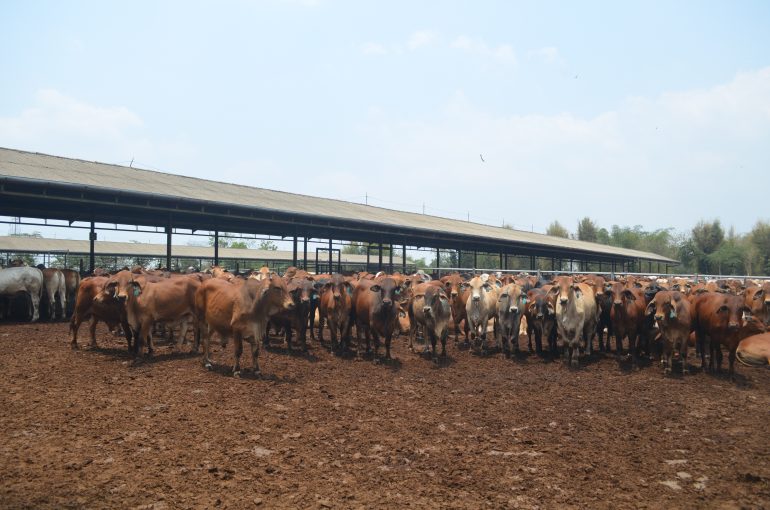
The Covid-19 pandemic has changed the world order dramatically and massively and has finally affected all sectors. As a result of the pandemic, the agricultural sector grew stagnant in the first quarter (Q1) 2020, which was 0.02%, slowing down from Q1 2019 which still grew by 1.82%.
This was revealed by the General Chairperson of the Indonesian Animal Husbandry Scholars Association (ISPI), Ir. Didiek Purwanto, IPU in the Obrolan Peternakan (OPERA) organized by the Faculty of Animal Science (FAS) UGM on July 3, 2020 through the Zoom Meeting.
“During this pandemic, the livestock sector only grew 2.86%, slowing down from Q1 2019 which grew 7.96%. In terms of meeting the need for beef, there is always a tremendous gap. The national demand for beef is 650,000 tonnes per year or the equivalent of 3.8-3.9 million heads while the total population of beef cattle by 2019 is only 17,118,650 heads,” Didiek said.
According to Didiek, the inability of local production to meet the national demand for meat is due to several problems that have not been resolved.
“Some of these things are the increasing gap between supply and demand, unclear development direction, regional ego after regional autonomy, and the unchanged farming patterns,” he explained.
During this pandemic, the situation was exacerbated by the price of cattle in Q1 reaching $ 3/ kg/life, the Q1 rupiah exchange rate penetrated Rp16,500.00 even up to Rp17,000.00, purchasing power decreased significantly, operational costs increased due to increased material prices feed raw materials, and trade and logistics systems are hampered by the implementation of PSBB in several regions in Australia.
“To overcome this, there are several actions that need to be done. First, the direction of livestock development that is structured, sustainable, equality of language and active participation of all stakeholders, empowerment and protection of local breeders. Second, harmonization of interdepartmental regulations that are in line with laws and regulations. Third, inventory and optimization of potential local resources, information and technology infrastructure must be in the regions,” Didiek said.
Fourth, Didiek added, livestock must be built based on clustering or spatialization of an area, supporting financing and fiscal policies and an effective and efficient financing scheme. Seventh, immediately drafting a spatial planning concept for industrial development, the structure of the agribusiness system, animal and veterinary health. Eighth, industrial-oriented and integrated livestock development by taking into account the demands of the era of globalization and industry 4.0.
“For that, I recommend a number of things, namely choosing livestock that are adaptive to the local environment, building productive grazing areas, optimizing local feed sources with a supplementation strategy, and stopping counterproductive policies with sustainable livestock development,” Didiek said.
In addition, it requires productive collaboration between the government, academics, business actors, and the community, a clear direction of development through careful analysis of data, and determining the pattern of livestock development in accordance with Indonesian conditions.
FAS UGM lecturer, Ir. Panjono, S.Pt., M.P., Ph.D., IPM., ASEAN Eng. who was also the speaker at the event said, before the pandemic, the beef cattle industry was under a lot of pressure, especially due to competition from imported meat.
“At the beginning of the pandemic, the beef cattle industry experienced difficulties both in terms of procuring livestock production facilities, particularly calf and feed, increasing distribution costs, and decreasing turnover due to reduced activities that require a lot of meat. Apart from that, the pandemic has also had a negative impact on the beef cattle industry due to the decline in people’s purchasing power,” Panjono said.
According to Panjono, this difficult situation during the pandemic can be overcome by implementing health protocols, production efficiency, product innovation through processing, and online marketing innovations. Processing of products, especially frozen processed products, will increase the shelf life and bring the industry closer to the final consumer thereby increasing market reach.
“There are two hopes that the condition of the beef cattle industry will improve. First, there is relaxation of MOA No. 41 of 2019 regarding the obligation to enter broodstock of 5%. Second, the implementation of the Indonesia-Australia Comprehensive Economic Partnership Agreement (IA-CEPA) related to import duties,” Panjono said.
